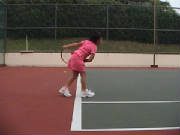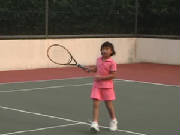It's as simple as that: the brain can't think and play tennis at the same time. Your play will deteriorate, because your
perceptions are dulled and corners are cut in timing and coordination. All to accommodate thinking.
You aren't going to see or hear or judge the ball very well. You won't notice things about the battlefield situation...like
that opening as big as a barn door in the opposition's court. In fact, you will even lose awareness of what your body is doing.
So don't think while the ball is coming. When the ball is coming, you don't want to be focused on your thinking, on what
you're supposed to remember. You don't want diminished awareness of what the ball and your body are doing. You want heightened
awareness of what the ball and your body are doing.
Therefore, what your mind does when you try to play by rote is actually a DISTRACTION. Yes, your own mind distracts your
attention from the ball and your body. This is why, as everyone knows, you play tennis best when you're not thinking. And
trying to remember something IS thinking. In fact, it's the heaviest kind of thinking there is.
You need to play the way you drive a car, by just seeing what to do and doing it without thinking — that is, by
doing it intuitively. Then you're using a different part of the brain in a much simpler process. It's the imagination where
nonverbal information is stored as raw experience to produce Natural Learning. That's where our instinctive, intuitive responses
come from.
To play tennis intuitively you can't just memorize verbal instructions about what to do in every situation. You must
understand the game at a deep level. This means that you must own the pure concepts and ideas so that they serve as a foundation,
or mental framework, you operate within as you play.
Result? Then the strategic features of the situation jump out of the background at you and grab your focus. You spot
and recognize them instantly as (a) threats to avoid, (b) opportunities to seize,
or (c) targets to aim at.


